- Home
- Rudy Rucker
Complete Stories Page 9
Complete Stories Read online
Page 9
My job right then was to run some computer simulations for the nuclear energy people. How many would die if we buried the radioactive waste in a diamond mine. What would happen if you put it in the polar ice-cap. How much would it cost to rocket it into the sun. They’d been stockpiling the waste for forty years now. Every time it looked like they’d decided on a solution, someone came up with a new “but what if.” Fletcher & Co. had taken an NRC contract to improve the simulations and, by God, make a decision.
Harry had promised to try to think of a brand-new solution, but I wasn’t counting on it. I just concentrated on debugging my programs. The extra money from Murden Chemical had helped, but if I couldn’t make the NRC happy enough to pay big bucks, then the leaser was going to repossess my central processing unit. I would have sooner given up my own medulla.
A week went by. Rosie brought me my lunch as usual, milk and tuna-salad sandwich. I didn’t like to stop programming when I was hot. But instead of quietly leaving, Rosie stayed standing next to me. Today’s dress was hologrammed to make a fountain out of her. It was distracting.
“Is there a problem, Rosie?”
“It’s Doctor Gerber. He’s been acting strangely.”
“When Harry stops acting strangely, I’ll worry. Meanwhile, could you get me some more milk?”
I went on eating and punching keys for a while, but then I realized she was still standing at my elbow. “All right,” I said, finally looking up. “Tell me about it.”
“I guess you know that Doctor Gerber and I are…are …”
I hadn’t. The possibility had never occurred to me. Harry? Rosie? They were my genius and my receptionist. It was hard for me to think of them as being anything else. It wasn’t in the flowchart.
“I didn’t feel it was my place to interfere,” I said finally.
“He moved in with me two months ago,” she said with a toss of her head. For a second I glimpsed her aquiline nose. “I’ve been after him to take me somewhere, somewhere far away. But now he hasn’t come home for a week. He just stays in the basement here and he won’t come out.”
So, I wanted to say, that’s what he always does when he’s onto something. Leave him alone! Instead I said, “Perhaps I’d better have a look.” I stood up.
“And tell him that I’ll stop nagging him about the trip if he comes back,” Rosie added.
Harry didn’t notice me at first. He was asleep. The basement looked like a minimalist sculptor’s studio. The main exhibit was a bowed ramp of titaniplast that looked like it had grown out of the floor. The ramp slanted down from one wall, and then swooped back up to the other wall. The ramp had a semi-circular groove on top, and at the low point there was a black titaniplast sphere. The setup reminded me of the ball-return gutter in some unearthly bowling alley. The ball was one-and-a-half meters across and looked heavy.
I walked past the greasy vinyl couch that Harry was lying on and looked at the sphere. The utterly rigid black material shone dully under the yellow electric lights. There was a hole cut in one side, a pentagonal hole big enough to crawl through. There was something funny about the space inside. It was like staring into a lens.
As I leaned closer I felt an unpleasant pressure on my temples. I straightened up, but the sphere kept getting closer. I was sliding across the floor. I jerked in fear and fell backwards. Crablike I scuttled back across the room.
“The only way to get in is fast,” Harry said suddenly. “It’s not so bad inside, I think. Positive curvature instead of negative.”
I sat up and looked around. Harry was lying on his back with his arms and legs sticking straight up. It must have been exercise, but it looked terrible.
“Rosie sent me,” I said, before I forgot.
“Why?”
“She wonders why you haven’t come to see her this week.”
“I’ve been busy.”
I decided I’d done enough for Rosie. “What’s the sphere for?”
“You roll it back and forth. It’s a dodecahedral skeleton of neutronium bars embedded in a shell of titaniplast. A padded jungle-gym for gravitons. What else did Rosie say?”
“She said that if you came back she’d stop nagging you about the trip. What happens when you roll the sphere back and forth?”
“I hoped she’d say that. I hate travel. I ought to go up and talk to her …”
He started out, but I caught him by the shoulder. “Harry, please tell me what you’ve built here.”
He looked back at me, baffled. “Can’t you see?”
“I see a hollow black sphere sitting on a rocker track. Why don’t we take it from there.”
“You remember my super-bubble ring? This is sort of the same thing. It’s to get rid of nuclear waste. Anything that’s inside the sphere disappears when the sphere rolls back and forth.”
My heart skipped a beat. “Have you tested it?”
“No. Wait a minute. I’m going to get Rosie.” He flicked on a switch and went upstairs.
While he was gone I looked the thing over some more. Harry had started a system of winches and pulleys running. Almost imperceptibly, the sphere was creeping up the ramp. I hoped it didn’t fall off. That degenerate matter packed a wallop. I sat down on the couch and started drafting my letter to the NRC. All things considered, a half billion a year didn’t seem like too much to ask.
When Harry and Rosie finally came back, I could see that hunky was still far from dory. Harry didn’t understand about apologies, about white lies. I wondered what she saw in him.
But with both of us there to impress, Harry became more communicative. His soap solution and super-bubble ring were under the couch, and he dragged them out. He made a big film and blew at the center of it. The film wobbled and bulged.
“That’s what space is like inside a massive object,” Harry said. “It curves towards the fourth dimension. Now, if I blow harder …”
He did, and a little bubble pinched off the film and floated away. “That’s the way a black hole does it. But we can’t use them. So instead…“
He blew out a little bulge in the soap film again. But this time instead of blowing harder, he jiggled the film back and forth. Ripples darted around on the film’s surface, and suddenly two of them happened to meet near the bulge. The walls met and a little bubble floated off again.
“That’s what the neutronium skeleton is supposed to do for us. The space inside it bulges way out towards the fourth dimension. Now when the sphere starts rolling down the ramp, those moving bars of neutronium are going to churn up waves like a mix-master. Sooner or later two waves will meet, and the bulge inside the sphere will pinch off to make a little hypersphere outside of our space.”
The winch motors turned off with a click. The sphere was poised at the top of the ramp.
“What happens then?” Rosie asked.
“The hypersphere floats away. Maybe it lands on a different space; maybe it comes back to ours someplace else.”
“Another space …” Rosie said slowly. “Like the astral plane?”
Harry shrugged. “If you want to call it that.”
The sphere had come to rest at the top of the track with the hole on the side pointing towards us. Harry had a little loading chute ready by the track there. It was aimed so that anything that slid down it would zip right through the hole in the sphere.
“What do you want to put in?” Harry asked.
“Would it…would it be dangerous for a person?” Rosie wanted to know.
“What a question!” I burst out. “You’d be squeezed to death! And then the gravity waves would work you over. And if by some wild fluke you lived through all that, where do you think you’d end up? Even if your space bubble ever did join up with a normal space again, what do you think the odds are that you’d land on the surface of an Earth-like planet?”
“Maybe it would take you to a different kind of space,” Rosie suggested mildly. “Where you don’t need planets.”
“Rosie will always have the mind of a
secretary,” Harry said cuttingly. “What do you say I put this in?” He picked up an empty cardboard box from the floor.
“Fine,” I said. “But let’s try something massive, too. A sandbag.”
Harry set the cardboard box at the top of the little sliding-board and let it go. The sphere’s field accelerated the box down the chute and it zoomed through the hole, getting somewhat crushed by tidal forces on the way.
Once inside, it bounced around for a minute before settling to the bottom. The bouncing had fluffed it back up again. Except for all the box’s right angles being a little too big, it looked fine.
“Why doesn’t the gravitational field in there crush it?”
“Anything inside is pushed and pulled in every direction at once,” Harry said. “Which adds up to nothing. Of course there’s still a strong positive curvature of space in there. And when those bars start moving around…but I don’t want to bore Rosie.” He shot her a nasty look, but she just stood there, stiff and alone.
Harry and I went upstairs then to get one of the sandbags from the radiation lab. It was a good fifty kilos, and it took the two of us to get it down the stairs. Neither one of us is getting any younger.
Rosie was gone when we got back downstairs. “You shouldn’t have said that about the mind of a secretary,” I told Harry.
He sighed. “Ah, she’s always talking about that fantasy-land stuff. If only I could get her to take a night-school physics course. There’s wonder enough in pure science without going in for a lot of malarkey. And she still won’t give up on that trip business.”
We heaved the sandbag onto the chute and it slid down to rest by the cardboard box. Then Harry tossed a cap-shaped titaniplast hatch-cover in place. The gravitational field slammed it on tight. We stood clear and he tripped the release.
The enormously heavy sphere rumbled down the incline, past the middle and back up to the other wall. Then it came back. I thought of a bubble wand waving back and forth. I thought I could feel the gravity waves in the pit of my stomach.
“It’s not moving very fast, Harry.”
“Doesn’t have too. The dodecahedral field configuration is inherently unstable, especially with that space mix-master going. I bet it has pinched off five hyperspheres by now. Hear the air rushing in?”
Indeed there was a hissing to be heard over the rumble of the track. As the space inside the neutronium sphere was blown away, new space and new air had to seep in. I actually felt myself drawn towards the sphere again, but this time from across the room.
It took about ten minutes for the oscillations to dampen, for the sphere to stop rolling back and forth. When we slid the hatch-door over with a long stick there was nothing inside.
“We ought to send a radio-beacon through the next time,” Harry remarked. “Then we could hear if it resurfaced somewhere in our space.”
“Tomorrow,” I said. “Right now I want to celebrate. What do you say I take you and Rosie out for the best meal of your lives?”
But we couldn’t find Rosie anywhere. In fact, she never showed up at the office again.
It’s funny about a girl like that. I never noticed her much when she worked for me, but now…now I dream about her every night. So does Harry.
============
Note on “Faraway Eyes”
Written in Fall, 1979.
Analog Science Fiction / Science Fact, September, 1980.
“Faraway Eyes” was the first story I sold to a mainline SF magazine, although by this time I’d serialized Spacetime Donuts in Unearth and I’d sold my novel White Light to both Virgin and Ace. But “Faraway Eyes” was my first “real” magazine sale.
“Faraway Eyes” introduces Joe Fletcher’s partner Harry Gerber. These are a very traditional SF pair of characters, whose roots go back to Robert Sheckley’s AAA Ace stories, to Henry Kuttner and beyond. Fletcher and Harry reappear in the stories “The Man Who Ate Himself,” “Inertia,” and in my novel Master of Space and Time.
I have the uneasy feeling that the various mass and size numbers in this tale are scientifically inaccurate. In later years I often had my engineer friend John Walker check the science in my writings.
The 57th Franz Kafka
20 January 1981.
Pain again, deep in the left side of my face. At some point in the night I gave up pretending to sleep and sat by the window, staring down at the blind land-street and the deaf river.
The impossibility of connected thought. Several times I thought I heard the new body moving in the long basin.
It began snowing during the night. I opened both windows and hunched myself forward with my mouth open, drawing in deep, aching breaths. My hope: a perfect snowflake, if sucked down wholly and rapidly, might reach the black center of my lungs and freeze them solid. Imagine breathing water, breathing ice. Later, hearing the bells toll, I wept.
After Mema brought me my breakfast, she went out to clean away the melting snow. I stood well back from the window lest she see my cheers and gloating grimaces.
After clearing the sidewalk, she had not yet had enough of wielding her scrub-broom, and stepped, repeatedly and at great risk, into the heavy land-street traffic, trying to clear off our half. She has, in the years since I dissolved the marriage, become an automaton. I realize this with finality when I see her stare uncomprehendingly after the splashing motorwagons, which again and again cover our half of the street, and splatter her apron and her thick legs with the grey, crystalline frosting.
The suppressed laughter hurts my chest. I begin to cough and have to sit down on my bed. Here I sit, words crawling off my pen-point.
There are only four more pages left in this, the last volume of my fifty-seventh series of diaries. I must write less.
23 January 1981.
Three days of fever. Straightening my wet bedclothes, Mema found my special pictures, the Fast-Night groupings, and took them away. What if Felice were to see them?
I have more pictures hidden in the attic, pictures I press to my ribs while I pour all my food out into the long basin. The new body is not so far along as I had hoped. There are still only the clotted fibers. It is strange that I could have thought otherwise.
25 January 1981.
Last night the worst yet. Dream: again Reb Pessin showing me the Book of Qlippoth, the secrets of immortality. A high buzzing, as of a tremendous propeller, drowns out his voice. The surprising weight of the little book. He makes a false gesture, and I spread out in space instead of time. A whole city where everyone wears my face, streets of women, the offices. A street-car conductor leaning over me, shaking with laughter, “If I were you …”
Awake before dawn. For the first time real fear that the new body will not be ready. But going into the attic with a candle, I see that all is well. Even the skin is finished.
26 January 1981.
Real sleep at last. Waking up, an unnatural feeling of lightness. So many memories are gone already, gone over.
I drank two cups of black tea with breakfast. Mema had to go back down to the kitchen for the second. When she brought it up, I had forgotten the first breakfast already, and asked her where it was. This is all as it should be. Soon I can begin again.
Yesterday, in a mood of wild exaltation, I mailed my remaining special pictures to Felice, first scribbling her real name on some of the women’s faces.
Now, cheerful and whistling from my sound sleep and my two cups of tea, I take pen in hand and compose another letter to her father:
-----
Honored Herr B!
I am not surprised that you have failed to answer my letters of 24.XII.80, 26.XII.80, and 15.I.81. You need not apologize! It is only right and natural that a man in your position must take thought, in the interests of his daughter, before moving to bind a marriage contract. The questions of my finances, age and health are undoubtedly your unspoken concerns.
As regards the question of age: I am forty-one, and will remain so. Although your daughter is now but twenty, she will i
n the course of time become sixty. Until that age, I vow to have and hold her as sole love-object. Frau Mema, my housekeeper and ex-wife, can attest to this.
My financial security is assured by certain interlocking fixed-interest annuities. I do not need to work, and I despise to do so. My brutto yearly income is in the excess of fifteen thousand thalers…not a figure to conjure with, but surely adequate for your little mouse’s needs.
The state of my health is a predictable matter. At present it is bad, and it will grow a bit worse. But next month, and in the summer, I will once again be fresh and strong. There can be no doubt of this.
Would a marriage date of February 30 be acceptable to you?
With high respect,
Franz K. LVII
-----
29 January 1981.
All evening, Mema watched television in the parlor, directly under my bedroom. The police were here yesterday, sent by Felice’s father.
They did not dare come up to me, and spoke only to Mema. I stood naked at the head of the stairs, baring my teeth and trembling with a fierce joy each time I glimpsed their green peaked caps. It struck me that the caps were living beings which wear policemen.
The excitement made me very weak, and all day I left the bed only to empty my cavities into the long basin. It is time to complete the task, to open my veins. Mema knows that today is the day, and under my feet she rocks and watches green, peaked caps move across the television screen.
30 January 1981.
LVIII is still waiting in the long basin behind the thin attic wall.
Last night I took candle and long knife and leaned over the basin, staring down through the thick, gathered fluids. The candle-wax dripped and sprung into little saucers, white disks that drifted down to rest on Franz LVIII’s closed eyelids. His mouth is set in a smile, as always.
I am not frightened of death, not after fifty-six times. But when my new body walks, the green, peaked caps will take it away. Herr B. must pay for this.

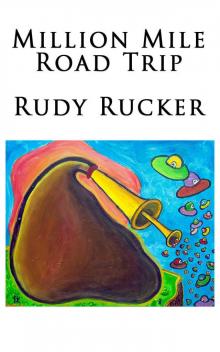 Million Mile Road Trip
Million Mile Road Trip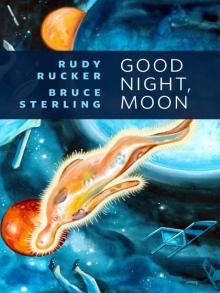 Good Night, Moon
Good Night, Moon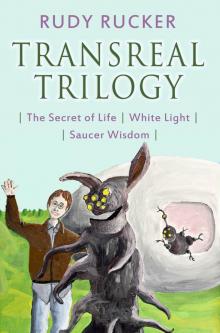 Transreal Trilogy: Secret of Life, White Light, Saucer Wisdom
Transreal Trilogy: Secret of Life, White Light, Saucer Wisdom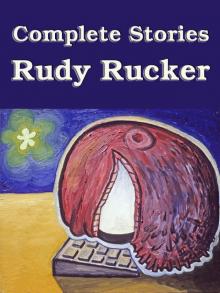 Complete Stories
Complete Stories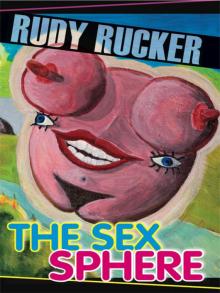 The Sex Sphere
The Sex Sphere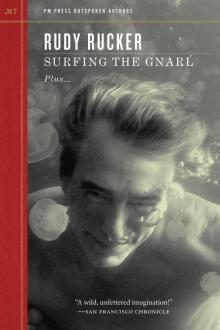 Surfing the Gnarl
Surfing the Gnarl Software
Software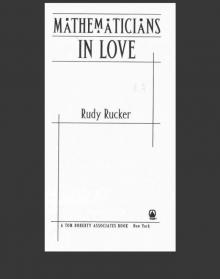 Mathematicians in Love
Mathematicians in Love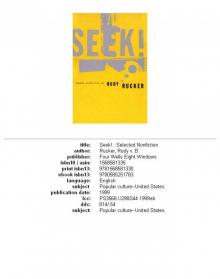 Seek!: Selected Nonfiction
Seek!: Selected Nonfiction The Secret of Life
The Secret of Life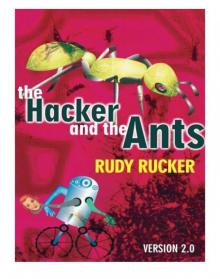 The Hacker and the Ants
The Hacker and the Ants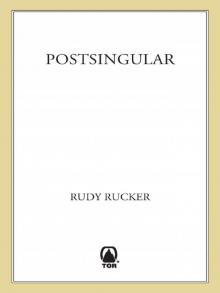 Postsingular
Postsingular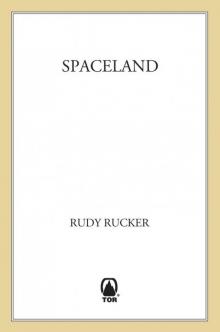 Spaceland
Spaceland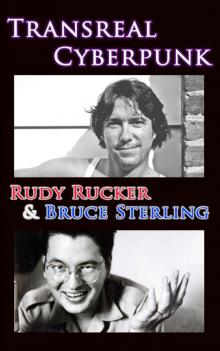 Transreal Cyberpunk
Transreal Cyberpunk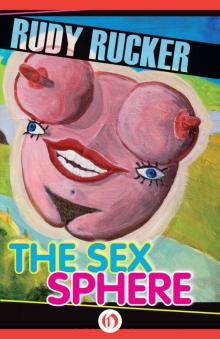 Sex Sphere
Sex Sphere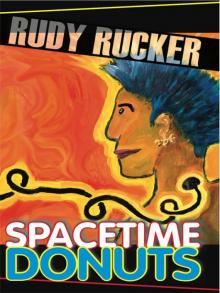 Spacetime Donuts
Spacetime Donuts Freeware
Freeware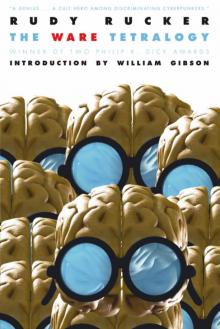 The Ware Tetralogy
The Ware Tetralogy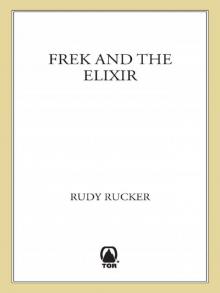 Frek and the Elixir
Frek and the Elixir Junk DNA
Junk DNA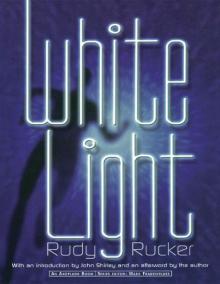 White Light (Axoplasm Books)
White Light (Axoplasm Books)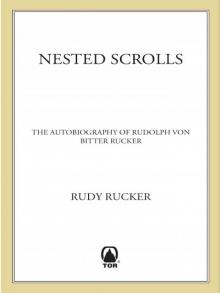 Nested Scrolls
Nested Scrolls Inside Out
Inside Out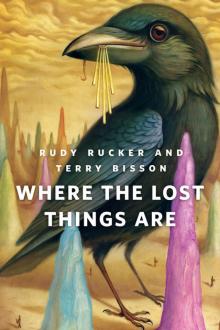 Where the Lost Things Are
Where the Lost Things Are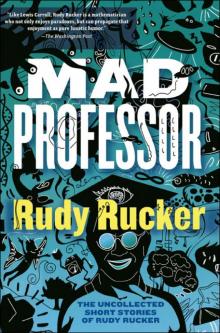 Mad Professor
Mad Professor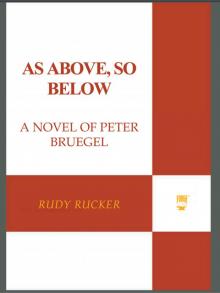 As Above, So Below
As Above, So Below Realware
Realware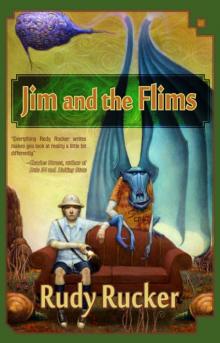 Jim and the Flims
Jim and the Flims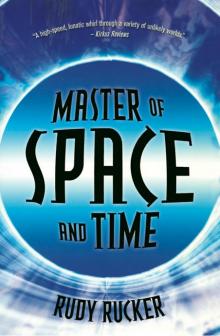 Master of Space and Time
Master of Space and Time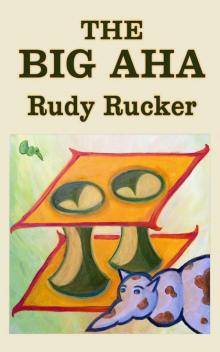 The Big Aha
The Big Aha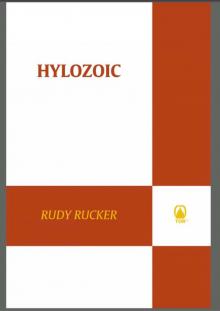 Hylozoic
Hylozoic